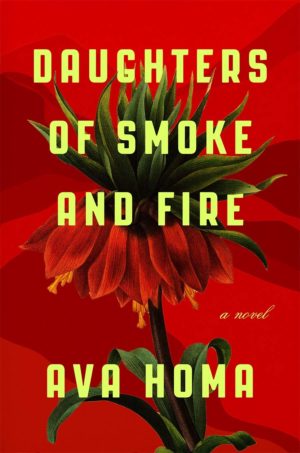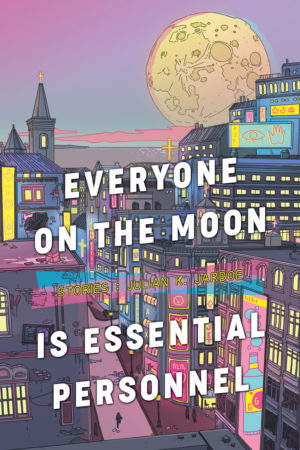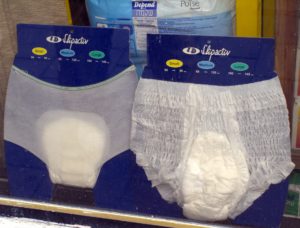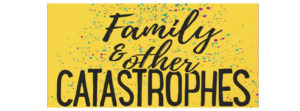The following story was originally published in Tragedy Queens, an anthology edited by Leza Cantoral
Going About 99
Shadows from the lace curtains cut your face into one hundred black lilies. You were in our bed, propped up too close to the fogged up window. Your mother had embroidered the satin pillow that made it possible for you to sit up because your body no longer could. Your muscles had all the strength of a toadstool trying to bolster a boulder. I didn’t mind that the bed smelled musty because you had spent the last week dying in it. But I did mind that your bones pushed through your yellow skin more and more each day. You had always been a substantial woman.
When we first fucked, I took comfort in the depths of your flesh. From there, we made love. Sometimes we made love hard and rough, but we still made love. I adored every pound of you. Friends accused me of having a fetish.
“What’s her fetish then? Skinny blonde bitches?” I quipped.
“No, that’s what everyone wants,” they said while sipping their margaritas at the only lesbian bar in town. “That can’t be a fetish.”
I told them that the reason their pussies were dry was because they had hearts of stone.
“Why are you so desperate? You could have anyone.”
“I’m desperate for her because she’s the one I want.”
Somehow, I had convinced myself that you didn’t want me. I felt certain that I wasn’t smart enough. You managed a prestigious archive at a university library while I hosted at a steakhouse downtown. Academics across the country interviewed you for journals and books from elite presses. Meanwhile, I could barely remember to give menus to the flocks of tobacco corporation executives who came to my workplace every day. You had discipline; I had dreams.
But if I hadn’t been bumbling my way through another dead-end job in the city that gave my pathetic little suburb the right to exist, I never would’ve met you.
“Table for one,” you crooned as you marched up to my stand. The harmony of your voice intrigued me, especially since it came from such plush, red lips. You were sharply dressed in a black cocktail dress and Kit Kat Club glasses to match. But it was the shock of pink hair that hooked me.
“One?”
“Yes, just me tonight.”
It was 2000 and I had been out all year. Just two years before you walked into that smoky steakhouse, the press outed George Michael after an undercover police officer found him having sex in a public restroom. Humiliated, he admitted that he was gay in a national CNN interview.
As a 23-year-old Baptist from the outskirts of Richmond, Virginia, I was not supposed to fall in love with you. I was supposed to fall in love with a weak-chinned boy from school or church and be married by now. Where was my ring? Where was my child?
“Would you like a table or a booth?”
“Oh,” you said, slightly startled but quick to chuckle. “Well, a booth then!”
“What brings you here tonight?”
“Nothing special. I’m a regular. I like the skirt steak.”
“I’ve never seen you here before.”
You raised your powdered eyebrows.
“I just mean we get so many businessmen. I think I would notice…a woman like you.”
We were standing at your table when you looked straight at me and said, “You mean a lesbian?” You laughed it off, but when you later told me you were testing your gaydar, I was flattered.
“Yeah, I guess,” I laughed, embarrassed. I pulled out your chair and set down the menu. “Enjoy your meal.”
Maybe our history might have ended with our encounter at table no. 7, but I found your note later that night. You had scrawled Do you like comics? with your name and number on a napkin. Best yet, you had written it in metallic purple gel pen. Even before I came out, I knew I wanted a woman with style.
“Panache,” you later corrected me. You were fingering me in the back of the archives that had become your life’s work when you whispered that in my ear. Somehow, you had singlehandedly persuaded thousands of comic geeks from across the country to donate their rare editions to the university library. In less than a decade, you had taken the collection from literally one title to the largest university comic book collection in the United States. All this before age 35.
You were bragging, but I didn’t mind. I wanted you to talk to me, to hold me, to run your fingers through my hair. I felt more electricity making out with you among those comic books than I did losing my virginity to Robby Stone the night of my junior prom. The latter had been my hetero test and I failed it. I wept for a month. To this day, I hate Camaros.
As you lay in our bed dying, I recalled the former roundness of your belly and how I took solace in it. You let me cry there until my mascara ran down my cheeks and I resembled the raccoons that terrorized my grandpa’s old apple farm in the holler. You said your weight came from all the cornbread that your mama made you when you were growing up in Charlotte.
Once you ended your cancer treatment, the doctor told me that you were almost too delicate to touch.
“I’ve touched a lot of ancient paper in the past sixteen years, doc. That’s what happens when you marry a librarian.”
He smiled, but didn’t say anything.
I touched you, anyway. I didn’t rest my head on your belly because you had no belly to speak of, but I did hold your hand. I stroked your sunken cheeks. I even rubbed lotion on your skeletal feet. I touched you as gently as I knew possible. I looked after you in ways the nurses could not.
Of course, there was no one to look after me. Even with in-home hospice care, the nurses must call it a day and return to their personal lives. We had no children and, apparently, no true friends. While plenty of people were happy to take part in our wedding, none of them could be bothered to comfort me or even relieve me from simple household chores. One goddamn casserole was too much to ask. The burden of carrying out the most mundane tasks while the love of my life was dying fell completely and totally on me. I accepted that I couldn’t rely on my homophobic, racist family, but what about my friends? Where was the so-called LGBTQ community? Where were my flag-waving, oh-so-open-minded allies? When I actually needed them, they could not be bothered.
Once the shift nurse went home, it was just the two of us. The first couple of nights, I attempted to fall asleep once the nurse left, but I could never squeeze in more than a nap before I woke up shrieking. I was terrified that you would die while I slept. So instead, I read to you until you fell asleep. At this stage, you could no longer sleep peacefully. Even though it pained me to watch you twitch and even kick in your feebleness, I kept my eyes on you. These moments were part of the countdown.
I could usually stand these periods of obsessive observation for about an hour. Then I had to pour myself a drink. It always started with one, but it could never end there. One drink became two and two became three and three became four and then I typically lost count. You knew when you married me that I had an addictive personality. You were just always there to temper it. Normally you would cajole me to bed and I no longer cared for another drink. My desire for you ignited every vein, every pore, every hair on my body. I would follow you to bed, knowing in my bones that you going down on me would give me a much bigger buzz than that next gin and tonic ever could.
Yet once you entered hospice care, you could not supervise or seduce me. Alcohol entertained me until it drowned my brains. I needed to drown them so I could forget that we would not grow old together. We would never venture to Paris or Australia together. We would never eat chicken quesadillas at our favorite drive-thru or catch another dollar movie at our go-to dollar movie theater. We would never make love ever again. I wanted to taste your cunt until you squealed and moaned. I wanted to kiss you until you teared up and giggled and cried.
But I couldn’t do much more than watch you.
The doctor had practically wrapped you up in caution tape.
On that seventh night of hospice care, I told myself that this was not how you wanted to live and this was not how you wanted to die. I cannot say how many drinks I’d had by then, only that I’d had more than any good Baptist girl was supposed to have. Needless to say, I was not a “good” Baptist girl. I wasn’t even a bad Baptist girl. I was a godless girl and I was not sorry for it. I was sorry for not loving you harder. I was sorry that I could not inhale you and possess you or even become you. I wanted to preserve you. I wanted to protect you. I wanted to take all of the faith I did not have in religion and put it in you.
When I left church life for good, we had been dating shy of three months. I swore that I no longer believed in God, but I didn’t invest that belief elsewhere. I believed in you in the sense that I supported you. But you were in your early 30s and had already accomplished so much. How much of my support did you really need? I doubted our relationship needed my faith, either. I took it for granted that we sustained each other. For that reason, I didn’t think our relationship needed faith. I should’ve believed in the power of us as much as I had once believed in the power of God. Even atheists need faith in something.
You were still doing your end-of-life equivalent of tossing and turning when I appeared at your side in my wedding dress. It shone scarlet in the lamplight. I discovered the iridescent gown at a disco vintage shop and wore it to the courthouse with twinning silk shoes. You had on the same cocktail dress you were wearing when we met. I had talked you into donning a daisy crown all through the ceremony and reception. It’s poignant to think that your black father and white mother were lucky to meet after the U.S. Supreme Court legalized interracial marriage. We met 14 years before gay marriage was legalized, but it wasn’t too late for us. We could still walk down that aisle.
I poked you because I wanted you to wake up and see me in my wedding dress. I wanted you to remember how beautiful I had been when we got married. Somehow in my drunkenness, I had even approximated the big beauty queen hair I wore on our wedding day. It wasn’t exactly a flawless recreation, but I knew you would get the idea.
I poked you again when you would not wake up. Aware that your sleep was not a deep one, I figured one poke would be enough to wake you. It was not. It took half a dozen prods to rouse you. Though your body remained stiff, you gradually fluttered open your hazel eyes. I couldn’t tell what color your eyes were when we first met because you had on glasses and the steakhouse was so dim. But on our first date, we were outside of a coffee shop in the light of day, discussing Superman and Little Audrey. Sometime during your telling of Lois Lane’s feminist revolution, I noticed that your eyes were pools of light brown with green and gray flecks. It was during that same conversation that you got me to admit that I wanted to be an illustrator.
You didn’t have much control of your facial expressions in this final phase, so I read your eyes. It took a few beats, but your eyes lit up when you registered that I had on my wedding dress. I almost tricked myself into thinking that you had turned. You weren’t going to die. You’d recover. You’d survive. We could go to Paris and Australia and the chicken quesadilla place and the dollar movie theater.
Then you coughed.
“No!” I shouted. It was the biggest noise the house had heard all week. I clamped my hands over my mouth. “I’m sorry,” I whispered. “I won’t be that loud again. I’ll put on some Nat King Cole—real soft, promise.”
“Unforgettable,” which we played for our first dance, eked from my iPod. The song had never sounded so slow before. But as you lay there, it played slowly and softly for you. Too drunk to mimic our first dance, I simply twirled.
This is the when the alcohol began making waves in my skull. It wouldn’t be the first time you saw me stumbling drunk, but it would be the last time. I always used to say that you were my weakness. While that was true, my fixation on you never hurt me the way my slavish dependence on gin hurt me. You encouraged me to draw, to pour out the contents of my imagination on the page. You encouraged me to abandon the church that made me miserable. You encouraged me to embrace my sexuality. All you ever did was encourage me, except when it came to drinking. That was one desire of mine you were eager to stifle.
I’m not sure how long I was twirling, but I could not spin around and around forever. I got dizzy and collapsed into the rocking chair that held my iPod. I thought the crunching noise came from my bones hitting the wood at the wrong angle. That wasn’t it. I had crushed the iPod. It was gone. Done. I threw the iPod’s remains against the wall and wailed.
Your beauteous hazel eyes had closed again, so I came over to rub your forehead.
“Wake up, my love,” I said.
You did not wake up.
“Wake up,” I growled. “Wake up. Wake up.”
I shook you by the shoulders and you woke up. Maybe I should’ve seen the terror in your eyes and stopped, but I did not. Instead, I kissed you. I knew I was not supposed to kiss you, at least not with any real vigor—any real feeling—but I did. You could not reciprocate. Your tongue remained curled up in your dry, dying mouth. Your once bee-stung lips were parched.
If I could not kiss you, I figured I could hold you. Thus, I violated another one of the doctor’s orders. I swept you up in my arms and cradled you. One year ago, I could not have possibly done that. For fifteen out of our sixteen years together, you dwarfed me. Now I was the big one, the strong one.
If you responded to me cradling you, I did not notice. As much as I loathe admitting it, the night was no longer about you. It was about me. Alcohol had made it about me. By drinking, I had made the night about me. It’s tempting to wonder whose brain was more alive then—yours or mine.
I kicked off my heels and stood up with you still in my arms. I stopped marveling at how light you were. Now it was a fact, just like the fact that you were dying. I couldn’t be stunned forever. The novelty of this new reality had worn off and my perception adjusted accordingly.
Maybe that is why I began heading toward our pool. It glowed in the backyard, calling to me as it had in all of our years hosting lesbian pool parties. Our email invitations always read “No boys allowed.” Funny how friends will come to your Southside house to enjoy your pool, but none of them will come to your Southside house to mow your lawn or do your laundry when your wife is dying.
The pool hadn’t only been for parties. Really, it was for us. Sometimes we’d read in our beach chairs and just stare at it as the water lapped the steps. Other times we’d play volleyball or swim laps. The sensation of underwater sex never lost its appeal, either.
Even in my drunken state, I knew we would not play volleyball or swim laps. Sex, too, was out of the question. But I saw no harm in us floating in our inflatable pool raft shaped like a Corvette. It was as pink as your hair had been at our wedding.
Maneuvering into the raft with you in my arms was no problem. For thirty seconds, I seemed to regain my sense of balance. I held you tight and, sometime while floating, I fell asleep.
You and I almost died once during the first year of our relationship. All of the downtown bars were closed, but you insisted on going into the city anyway. You were almost certain that this one diner was still open. Those were the pre-Internet days and you saw no point in calling, so we had to drive there to find out. When we approached the James River Bridge, you let out a battle cry and hit the gas. It was clear at 3 a.m., which made the fact that you were going about 99 a little less unforgivable. Still, I was horrified.
That horror increased tenfold when a homeless man toppled into the street. You swerved to miss him, momentarily losing control of the car. You just missed a lamppost as we ricocheted from one side of the bridge to the other and then shot down the length of it into Richmond.
“We made it!” you yelled, a crazed grin taking up more than half of your face.
I sat in silence for a full minute before confessing that we needed to go home because I shat my pants.
We could not have possibly been going 99 in our Corvette raft when I woke up. Yet we had been going fast enough—or at least clumsily enough—that you had fallen off of the raft. I didn’t realize it at first because I didn’t understand why I was in the pool. I didn’t know where I was and I couldn’t remember why I had on my wedding dress. What I did know was that I had been clutching you like the most precious jewel on earth because that’s exactly what you were to me. But I had let you go. I deduced this because you were facedown in the water.
This was not a nightmare. This was my life, which had somehow escalated past the terror of any nightmare I had ever had. After days of forcing myself to stay awake for your last breath, I had been asleep when you died.
I paddled the raft over to you and scooped you up. It was only then, holding you as the Blessed Mother held Christ that I howled. Otherwise, I did not move.
I am still in this raft with you in my arms, not knowing what I will tell the police, though I swear I will call them at sunrise. All I do know is that I will never drink again or draw again or love again. I could say that it was your greatness that has made such things impossible, but really it is my worthlessness. When you told me that I was worthy, you were lying. I am less than the scum sticking to the sides of our pool, your deathbed.
**
Christine Stoddard is an artist working across writing and text-based media, as well as sculptural photography and videography. She is the author of Water for the Cactus Woman (Spuyten Duyvil Publishing) and Hispanic & Latino Heritage in Virginia (The History Press), among chapbooks from Dancing Girl Press, Maverick Duck Press, Another New Calligraphy, and other small presses. Her work has appeared in the New York Transit Museum, the Queens Museum, the Poe Museum, the Ground Zero Hurricane Katrina Museum, Annmarie Sculpture Garden, FiveMyles Gallery, and beyond. Her words and images have been published in The Huffington Post, The Feminist Wire, Bustle, Marie Claire, The Brooklyn Quarterly, Hispanic Culture Review, Native American Peoples, Bushwick Daily, Yes! Magazine, Whurk, The Establishment, So to Speak, and elsewhere. As the founder of Quail Bell Magazine, she has edited two anthologies and multiple zines recognizes by Washington Post Express, Time Out New York, Vol. 1 Brooklyn, and other outlets. In the summer of 2018, Stoddard will be a visiting artist at Laberinto Projects in El Salvador and the Woodstock Art Museum in Woodstock, New York. Currently, she is an MFA candidate in the Digital & Interdisciplinary Art Practice program at The City College of New York (CUNY). She lives in Brooklyn with her husband, David.







